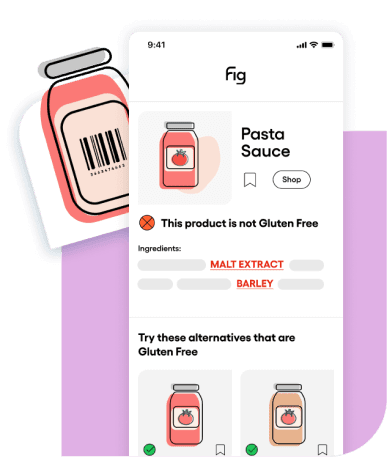Is wheat gluten free?
Wheat may not be gluten free. Wheat is a grain that contains gluten. Most forms of wheat including wheat flour, wheat germ and wheat protein contain gluten; however, other forms do not necessarily need to be avoided on a gluten free diet. These include wheat dextrin and wheat maltodextrin; the gluten in these ingredients has been removed in processing. Wheat starch can have varying levels of gluten. When a wheat ingredient is present, always look for a "gluten free" product label which indicates the product has been tested to be less than 20 parts per million gluten per the FDA's standards.
Fig's dietitians reviewed this note on wheat. Check ingredients faster with the free Fig app!

Check if any food or ingredient has gluten
Simply scan a food product with Fig. The app flags ingredients that may contain gluten. Click any ingredient like wheat to read more about its likely gluten content.
Find food that fits your specific needs
First, customize Fig with more than 100 diet and 2,000 ingredient selections. Then, use Fig to search for new foods that fit all your needs.
Fig is free and works with more than 100 grocery stores!


What to consider when starting a Gluten Free diet
Millions of people are now avoiding gluten. Some people avoid gluten because they have a gluten-related disorder like Celiac Disease. Others avoid gluten because it helps them feel their best. If you're not sure how to get started, check out our Guide to a Gluten-Free Diet.
Gluten is found naturally in ingredients like wheat, barley, and rye. It may also be found in other grains like oats due to cross-contamination. If you scan a food product with Fig, it will tell you if an ingredient like wheat naturally has gluten or if it may be at risk of cross-contamination.
When searching for gluten free foods, look for a certified gluten free logo. In the United States, this means the product has less than 20 parts per million gluten. Also check allergen statements for the presence of wheat.
We've done our best to ensure this note on wheat is accurate. When starting a gluten free diet, it's generally best to work with a trained dietitian or clinician.